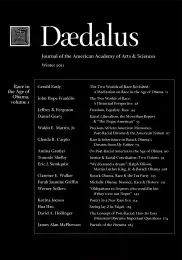The Concept of Post-Racial: How Its Easy Dismissal Obscures Important Questions
Nearly all of today's confident dismissals of the notion of a “post-racial” America address the simple question, “Are we beyond racism or not?” But most of the writers who have used the terms post-racial or post-ethnic sympathetically have explored other questions: What is the significance of the blurring of ethnoracial lines through cross-group marriage and reproduction? How should we interpret the relatively greater ability of immigrant blacks as compared to standard “African Americans” to overcome racist barriers? What do we make of increasing evidence that economic and educational conditions prior to immigration are more powerful determinants than “race” in affecting the destiny of population groups that have immigrated to the United States in recent decades? Rather than calling constant attention to the undoubted reality of racism, this essay asks scholars and anti-racist intellectuals more generally to think beyond “the problem of the color line” in order to focus on “the problem of solidarity.” The essay argues that the most easily answered questions are not those that most demand our attention.
Why are so many people afraid of the concepts post-racial and post-ethnic? Both are often brushed aside amid a competition over who can declare the most resoundingly that racism is still a vital problem in the United States, and that the physical marks of descent remain highly determinative of an individual’s destiny. One pundit after another proclaims sanctimoniously that all one must do is look at the color of the prison population, or at the 2009 arrest of Harvard University Professor Henry Louis Gates, Jr., in his own home, and one will see that all this talk about a post-racial America is nonsense.1
Yet almost none of the people who have sympathetically used the terms post-ethnic and postracial have advanced the claims now being refuted with such ease; rarely have they used the terms in a manner that could leave one wondering, what were those prophets of post-ethnicity and postraciality smoking when they started talking in such terms? The gap between what is being refuted and what is being affirmed is a discursive Grand Canyon.
What is being affirmed? I tried to summarize it in an essay for the journal Callaloo in 2008. I suggested that the election of Barack Obama as president–that historic event of the election of a black president of the United States–made it easier to contemplate “a possible future” that might be called post-ethnic or post-racial: . . .
